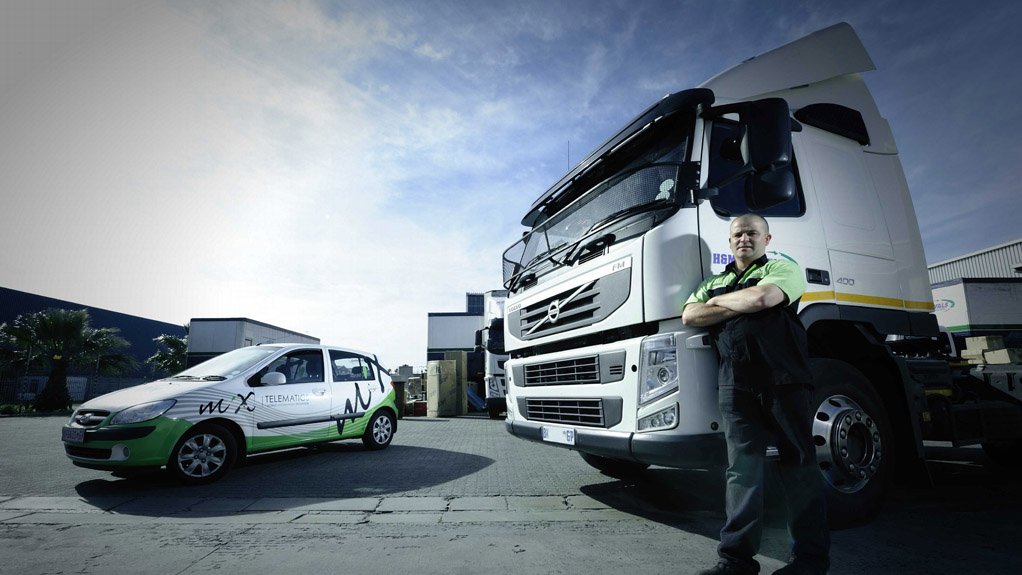Owing to the South African economy being under pressure, theft-related incidents are increasing. This is driving demand for technology that mitigates these risks, with the number of fleet management systems active in South Africa expected to increase from 0.9-million units at the end of 2015 to 1.5-million units by 2020, says fleet management and vehicle tracking company MiX Telematics product and marketing director Grant Fraser.
Telematics refers to any integrated use of telecommunications with information and communications technology, but the term has evolved to refer specifically to global positioning system (GPS) vehicle tracking.
MiX Telematics’ MiX Fleet Manager Solutions, and value-add services, for small and large fleets, assist businesses in identifying and rectifying poor driving behaviour to reduce accidents and improve safety, and reduce fuel consumption through awareness and improved driving style. It also aids in monitoring driver performance to implement highly effective, targeted driver training programmes, develop customised driver safety policies and keep vehicles serviced and safe on the road. MiX’s comprehensive fleet management solution consists of in-vehicle monitoring systems that can monitor driver performance and identify unsafe behaviours, as well as provide audible alerts and safety consultants to help establish, review and audit systems, processes and strategies related to land transport safety.
He notes that telematics solutions empower commercial fleet operators by enabling them to actively manage, monitor and measure the performance of drivers and assets.
“Driver management is a major challenge for transport businesses. Driver behaviour impacts on many elements that fleet managers are required to manage so as to contain and reduce costs. There is a big focus on driver monitoring and training, and it is critically important to have well-trained drivers,” says Fraser.
Such drivers take better care of the vehicles, use less fuel while driving (which also requires fewer tyre replacements) and are involved in fewer accidents, he highlights.
Fraser states that the fuel and maintenance cost savings achieved, ensure return on investment through MiX Telematics Fleet Management Solution. The system also benefits drivers in terms of job safety and security as gathered information can be passed on to drivers.
As fleet management solutions providers are equipping more fleets with the ability to gather telemetrics data during trips, drivers can make more informed driving decisions, owing to the additional traffic- and road-related information available to them. Harsh breaking, acceleration and cornering can be reduced, as telemetrics systems are linked to GPS services, which have made road speed and area monitoring and restriction services available to fleet managers and drivers.
“Fleet owners will see the real value of telematics systems in the predictive analysis capabilities that the systems allow for, where they can anticipate disruptions and deviations from the planned trip. The system enables fleet managers to react quickly in real time and mitigate risks while doing so,” Fraser states.
He states that telematics data needs to be put to good use in terms of running businesses more efficiently and engaging with customers to improve customer service. Simple and cost-effective solutions, such as ‘Report my driving’ initiatives, integrated into a fleet management solution, will have a significant impact on businesses’ bottom lines, he notes. The ‘Report my driving’ decal displayed on vehicles can reduce accidents by 20% and accident-related costs by 52%, he states.
Commenting on the importance of integrated solutions, Fraser states that telematics solutions providers should assist clients in integrating new telematics technology into existing platforms.
“Integrated telematics data viewed in real time can be used as the basis for informed business decisions. The advanced telematics software gives customers access to a comprehensive suite of recording tools that include movement, events, trip reporting, and fuel consumption reports,” Fraser says.
He states that, in the past, fleet owners made decisions based on prescriptive factors with limited knowledge regarding roads and infrastructure. Owing to the Internet of Things (IoT), fleet owners will move to a reality-based or data-driven environment. He adds that, with the amount of IoT information made available by the new telematics systems, fleet owners need to interpret this data to gain a competitive edge.
MiX Telematics is continuously developing new solutions as the software requirements in the fleet management industry change. “The company develops smart, intelligent reporting, which enables fleet managers to react very quickly to the environment . . . ” he says.
“Jamming is a big problem in the sector, as criminals may be interested in taking the vehicle as well as the load being carried. From a technology point of view, the company is consistently looking for ways to negate jamming,” Fraser notes.
He says the company has developed a system in which MiX Telematics gets an advanced warning if jamming is detected, which enables the company to react very quickly in assisting customers to protect their assets.
Meanwhile, Fraser states that telemetry forms the core of the company’s solution offerings, but that it does provide tailored solutions for industry-specific applications, such as its ability to set up in-trip temperature monitoring for cold chain applications.
“Our solutions depend largely on customers and their intended application for their vehicles; however, MiX Telematics certainly leverages its presence and knowledge in telemetry to offer fleet management and logistics solutions that not only protect fleets but also enable better decision-making regarding asset-value maximisation,” he concludes.
Edited by: Zandile Mavuso
Creamer Media Senior Deputy Editor: Features
EMAIL THIS ARTICLE SAVE THIS ARTICLE
To subscribe email subscriptions@creamermedia.co.za or click here
To advertise email advertising@creamermedia.co.za or click here













